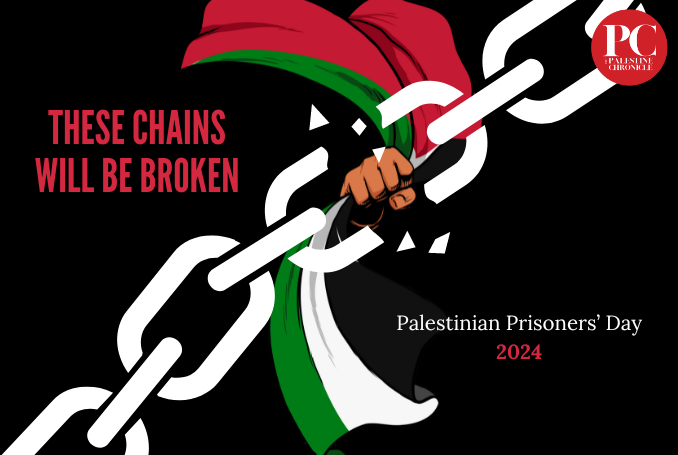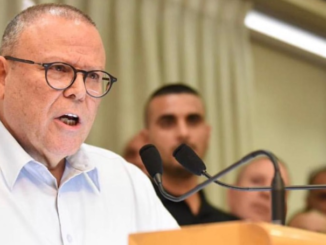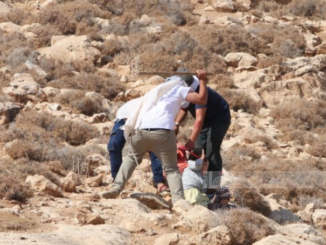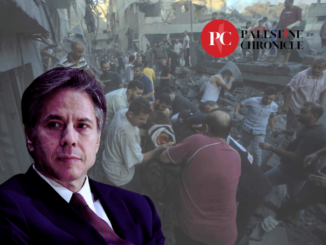
April 17 was adopted by the Palestinian National Council in 1947 as a day to honor the thousands of Palestinian detainees held in Israeli prisons and to support their right to freedom.
On Palestinian Prisoners’ Day, the Palestinian Resistance Movement Hamas has said the liberation of Palestinians from Israeli prisons remained a top priority and has been “at the heart of the ongoing Al-Aqsa Flood.”
In a statement on Wednesday, Hamas said this year the day “comes amidst the heroic battle of Al-Aqsa Flood, in which our people and their valiant resistance have been engaged for over six months.”
“On this day, our people recall the suffering and pain of thousands of prisoners and detainees in the zionist enemy’s prisons, as well as their sacrifices and heroics in overpowering the Zionist jailer, renewing their vow of loyalty and solidarity with them until their liberation from the occupation’s prisons.”
April 17 was adopted by the Palestinian National Council in 1947 as a day to honor the thousands of Palestinian detainees held in Israeli prisons and to support their right to freedom.
The date was chosen because it witnessed the release of the prisoner Mahmoud Bakr Hijazi in the first prisoner exchange between the Palestinian resistance and Israel.
Also, in late March 2008, the 20th Arab Summit, held in the Syrian capital of Damascus approved the adoption of this day to be marked in all Arab countries, in solidarity with Palestinian and Arab prisoners held in Israeli prisons.
Women and Children
According to data published by Palestinian Prisoner Rights institutions, the number of Palestinians in Israeli prisons has reached more than 9,500.
The PLO’s Commission for Prisoners’ and Ex-Prisoners’ Affairs, the Prisoners’ Club and the Addameer Prisoner Support and Human Rights Association, released the data in a joint statement on Tuesday, on the eve of Palestinian Prisoners’ Day, reported the Middle East Monitor (MEMO).
The prisoners include 80 women and more than 200 children who are held in Megiddo, Ofer and Damon prisons. However, the numbers do not include detainees from the Gaza Strip, who are subject to enforced disappearance.
The statement said the number of administrative detainees who are held without charge had risen to more than 3,660, as of the beginning of this April, including 22 women and more than 40 children.
The number of detained journalists also reached 56, including 45 who had been arrested after 7 October and are still in detention, including four female journalists, the report said.
Israel also imprisons hundreds of sick and wounded detainees and their numbers have constantly increased after October 7 as a result of “the crimes, policies, and systematic retaliatory measures imposed by the Occupation on the prisoners, most notably torture and medical crimes”, the statement reportedly said.
Israel Subjects Female Gaza Prisoners to ‘Torture and Abuse’ – Rights Group
Israel arrested 21 prisoners since before the Oslo Accords signed between the PLO and Israel in 1993, in addition to eleven prisoners who were arrested before the agreement. They were released as part of the “Loyalty to the Free” deal that took place in 2011 in exchange for the Israeli soldier, Gilad Shalit, but they were re-arrested in 2014, according to the report.
Life Sentences
Hundreds of Palestinian detainees have been imprisoned for more than 21 years; most of them are serving life sentences.
According to the Prisoners’ Club, there are 600 detainees serving life sentences (99 years according to Israeli military law) one or several times. This includes prisoner, Abdullah Barghouti, who had been sentenced to 67 life sentences.
The Prisoners’ Club data indicate that 252 detainees have died inside prisons since 1967, including 16 after October 7, not including prisoners from the Gaza Strip who were forcibly disappeared by Israel.
Israel Responsible for Neglect, Death of Detainees – Palestinian Prisoners Society
Israeli authorities are also holding the bodies of 27 prisoners and refusing to hand them over to their families, the oldest of whom is Anis Dawla, who died in Ashkelon prison in 1980, according to the statement.
In a report of April 8, the Palestinian Prisoners Society (PPS) said in a statement that the number of Palestinian prisoners who have died in Israeli prisons since October 7 had risen to 14, as a result of torture, abuse, starvation and medical neglect, the last of whom was the political prisoner, Walid Daqqa.
The 62-year-old writer and activist, who had cancer, died after 38 years in detention.
‘Slow Killing’ – Cancer-Stricken Palestinian Prisoner Walid Daqqa Dies in Israeli Prison
Slow Killing
Palestinian prisoner societies said his death was a result of the policy of deliberate medical negligence and slow killing carried out by the occupation authorities.
The PPS also said, “Israeli prison authorities continue to starve more than 9,100 detainees, including women, children and sick.”
“Starvation is the most dangerous policy pursued by the Israeli occupation since October 7, in addition to torture and abuse,” the prisoner society reportedly said.
In this report, female detainees told the Palestine Chronicle of the abuse they experienced and witnessed in detention in Gaza.
In February, the Geneva-based Euro-Med Human Rights Monitor shared testimonies from recently released Palestinian detainees that indicate the Israeli army allowed groups of Israeli civilians to witness Palestinian detainees being tortured, and to film the crimes on their phones.
Palestinian Prisoners Subjected to ‘Starvation, Torture, Abuse’ – NGO
The report said, “groups of ten to twenty Israeli civilians at a time were permitted to watch and laughingly film Palestinian prisoners and detainees in their underwear while Israeli army soldiers subjected them to physical abuse.”
This abuse included “beating them with metal batons, electric sticks, and pouring hot water on their heads. The detainees were also verbally abused.”
Sexual Assault
In February, a group of UN experts called for allegations of human rights violations against Palestinian women and girls in the Gaza Strip and the occupied West Bank to be investigated.
The experts said they “are particularly distressed by reports that Palestinian women and girls in detention have also been subjected to multiple forms of sexual assault, such as being stripped naked and searched by male Israeli army officers.”
“At least two female Palestinian detainees were reportedly raped while others were reportedly threatened with rape and sexual violence,” the experts stated.
They also noted that “photos of female detainees in degrading circumstances were also reportedly taken by the Israeli army and uploaded online.”
Beaten, Strip Searched – Female Palestinian Detainees Tell Harrowing Stories
Hamas has called on human rights organizations “to expose the cimes of the occupaation against the prisoners and detainees of our propel in the Gaza Strip, the West Bank, Al-Quds, and the occupied interior.”
The movement said its goal of “liberating our heroic prisoners” has been at the heart of the ongoing Al-Aqsa Flood
The Palestine Chronicle affirms that Palestinian prisoners are the struggle of our compass.
“All Palestinians are captives, according to the reality on the ground, because all Palestinians are victims of Israeli colonialism, military occupation and apartheid,” said Ramzy Baroud, Editor of The Palestine Chronicle, who was born in Gaza.
(PC, MEMO)









It appears the ground rule for evaluating Israeli statements on Palestinians is, “Every accusation a confession”.